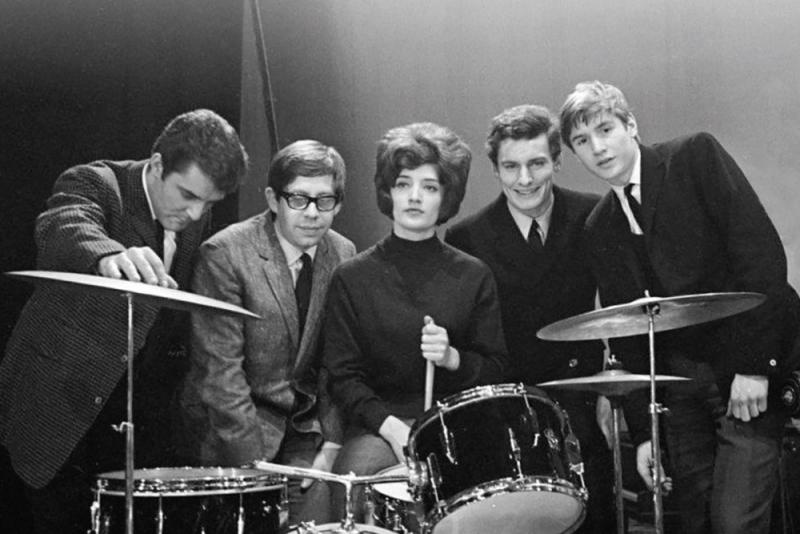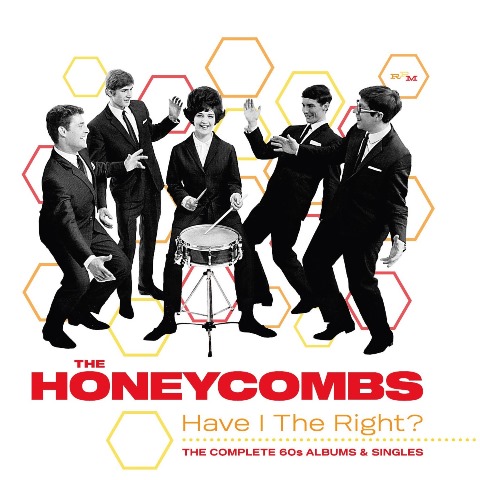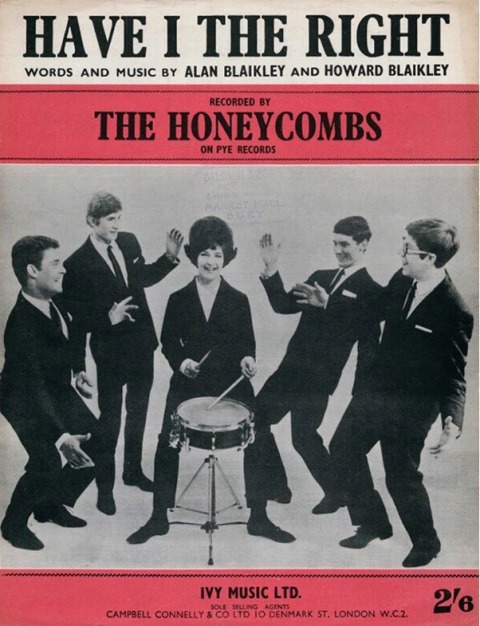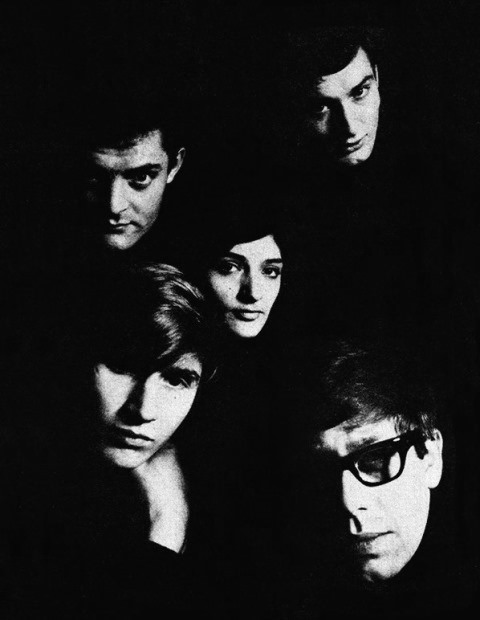Reissue CDs Weekly: The Honeycombs - Have I The Right? The Complete 60s Albums & Singles | reviews, news & interviews
Reissue CDs Weekly: The Honeycombs - Have I The Right? The Complete 60s Albums & Singles
Reissue CDs Weekly: The Honeycombs - Have I The Right? The Complete 60s Albums & Singles
Exhaustive box set dedicated to the Joe Meek-produced hit-makers

August and September 1964 were golden months for Pye Records. The Kinks hit number one on the British charts in September with “You Really Got Me”, their third single for the label and the group’s first success following two flop 45s.
Before The Kinks, the top spot was occupied by The Honeycombs’s debut single “Have I the Right?”, where catchiness and a big beat combined to make a radio- and sales-friendly smash. It was issued by Pye in June, and took a while to become a best-seller. But no matter, the label behind both singles now had more than The Searchers on its beat-era books to demonstrate it was a major player on the booming group scene.
 The Honeycombs themselves could be delighted. “Have I the Right?” was also a hit in America, where it charted after the similarly stamp-happy Dave Clark Five had already made a mark. Yet instead of conquering America like the Tottenham heroes, The Honeycombs would become yesterday’s news. A follow-up single, "Is it Because", scraped into the Top 40. Next, the intense, wonderful and proto-psychedelic “Eyes” didn't even do that. “Something Better Beginning”, a Kinks cover, did a little better in March 1965, but their only real subsequent hit was July 1965’s “That's the Way”. After that, no action and The Honeycombs ran out of steam in the first half of 1967.
The Honeycombs themselves could be delighted. “Have I the Right?” was also a hit in America, where it charted after the similarly stamp-happy Dave Clark Five had already made a mark. Yet instead of conquering America like the Tottenham heroes, The Honeycombs would become yesterday’s news. A follow-up single, "Is it Because", scraped into the Top 40. Next, the intense, wonderful and proto-psychedelic “Eyes” didn't even do that. “Something Better Beginning”, a Kinks cover, did a little better in March 1965, but their only real subsequent hit was July 1965’s “That's the Way”. After that, no action and The Honeycombs ran out of steam in the first half of 1967.
Whatever the spottiness of their chart record, The Honeycombs issued a lot of records. The 3-CD clamshell box set Have I The Right? The Complete 60s Albums & Singles collects 73 tracks by them (radio sessions and few previously unreleased tracks are included), plus six tracks from solo singles by their members. They released three albums: two in the UK and a rare Japan-only live album. The latter takes up the bulk of Disc Three.
Producer Joe Meek’s involvement with their UK releases meant The Honeycombs had a rinky dink but charming sound: edgy, fizzing and trebly. Usually, what was issued was a speeded-up version of what had been recorded. Amongst the gems heard are “She’s Too Way Out” (a Meek co-write), the sonic equivalent of a careening pinball, and “That’s the Way”: gospel as if filtered through the mind of chipmunk.
 For Meek, The Honeycombs were a form of lifeline. Until they were brought to him by manager-songwriters Ken Howard and Alan Blaikley, he had been suffering a hit-free period pumping out singles by his pre-Beatles mainstays Heinz, John Leyton and The Tornadoes. Other acts like Houston Wells & The Marksmen (instrumental, the sound of an earlier era), Burr Bailey (novelty cowboy stuff) and other lesser lights weren’t bringing home the bacon. Odd singles suggested an awareness of the changing times: he worked with the R&B-inclined Screaming Lord Sutch & The Savages and on a March 1964 single by London R&B band The Syndicats. But the hits were not coming.
For Meek, The Honeycombs were a form of lifeline. Until they were brought to him by manager-songwriters Ken Howard and Alan Blaikley, he had been suffering a hit-free period pumping out singles by his pre-Beatles mainstays Heinz, John Leyton and The Tornadoes. Other acts like Houston Wells & The Marksmen (instrumental, the sound of an earlier era), Burr Bailey (novelty cowboy stuff) and other lesser lights weren’t bringing home the bacon. Odd singles suggested an awareness of the changing times: he worked with the R&B-inclined Screaming Lord Sutch & The Savages and on a March 1964 single by London R&B band The Syndicats. But the hits were not coming.
Once “Have I the Right” was selling, it meant Meek had some money to deal with his business problems. He was able to buy out the co-owner of his RGM Sound production company. Later though, his former in-house songwriter Geoff Goddard brought a case against him alleging that that he and Meek had co-written “Have I the Right”. Apparently Howard and Blaikley, who got the credit, had not written the song. Goddard’s case went to court but was not upheld.
Howard and Blaikley came across The Honeycombs as The Sheratons in a north London pub (earlier, the band had a brush with early David Bowie manager Les Conn so were already known within the music business). The duo had a song titled “Give Me the Chance” which Meek renamed "Have I the Right”. The on-the-rise pair next found another band, Dave Dee & The Bostons who were also taken to Meek. But unlike The Honeycombs, this lot weren’t malleable and objected to the producer’s predilection for creating masters which edged towards sounding like Pinky and Perky. Meek would play no part when they became chart regulars Dave Dee, Dozy, Beaky, Mick & Titch. Interestingly, Have I The Right? features The Honeycombs’s normal-speed backing track for their big hit. It’s strange hearing this perennial this way.
 The lack of staying power was partly The Honeycombs fault. They toured Australasia after “Have I the Right?” charted so were unable to promote the record. It was the same in 1965 with “That's the Way", as they were in Japan in August 1965.
The lack of staying power was partly The Honeycombs fault. They toured Australasia after “Have I the Right?” charted so were unable to promote the record. It was the same in 1965 with “That's the Way", as they were in Japan in August 1965.
Bad decisions notwithstanding, the band were unstable. Founder member Martin Murray left in December 1964. He received a pay-off of £12,000. The box set’s liner notes quote him saying he was “was unofficially engaged to be married to [the band’s drummer] Anne Lantree.” The text then says he left because band members were not behaving professionally enough. Whether his departure and an issue with his relationship with Lantree are related is not said. Unfortunately, the liner notes also do not explain the circumstances of their Japanese album and the two singles they issued there in 1965, or the stories behind the solo singles by Martin Murray (one in 1966) and their Gene Pitney-esque singer Dennis D’Ell (two in 1967).
Aside from the unanswered questions, what’s left is a disproportionately large amount of music which at its best includes some of the Sixties most gratifyingly off-centre records. For unsophisticated yet appetising British Sixties pop, head to Have I The Right? The Complete 60s Albums & Singles. Note though, as has been registered on a sales website, there is a problem with the track “Love in Tokyo”, on which a momentary missing section sounds akin to a record skipping.
- Next week: Bona Rays - lost London punk band are disinterred
- More reissue reviews on theartsdesk
- Kieron Tyler’s website
Explore topics
Share this article
The future of Arts Journalism
You can stop theartsdesk.com closing!
We urgently need financing to survive. Our fundraising drive has thus far raised £49,000 but we need to reach £100,000 or we will be forced to close. Please contribute here: https://gofund.me/c3f6033d
And if you can forward this information to anyone who might assist, we’d be grateful.

Subscribe to theartsdesk.com
Thank you for continuing to read our work on theartsdesk.com. For unlimited access to every article in its entirety, including our archive of more than 15,000 pieces, we're asking for £5 per month or £40 per year. We feel it's a very good deal, and hope you do too.
To take a subscription now simply click here.
And if you're looking for that extra gift for a friend or family member, why not treat them to a theartsdesk.com gift subscription?
more New music
 Music Reissues Weekly: Joe Meek - A Curious Mind
How the maverick Sixties producer’s preoccupations influenced his creations
Music Reissues Weekly: Joe Meek - A Curious Mind
How the maverick Sixties producer’s preoccupations influenced his creations
 Pop Will Eat Itself, O2 Institute, Birmingham review - Poppies are back on patrol
PWEI hit home turf and blow the place up
Pop Will Eat Itself, O2 Institute, Birmingham review - Poppies are back on patrol
PWEI hit home turf and blow the place up
 'Fevereaten' sees gothic punk-metallers Witch Fever revel in atmospheric paganist raging
Second album from heavy-riffing quartet expands sonically on their debut
'Fevereaten' sees gothic punk-metallers Witch Fever revel in atmospheric paganist raging
Second album from heavy-riffing quartet expands sonically on their debut
 theartsdesk Q&A: Soft Cell
Upon the untimely passing of Dave Ball we revisit our September 2018 Soft Cell interview
theartsdesk Q&A: Soft Cell
Upon the untimely passing of Dave Ball we revisit our September 2018 Soft Cell interview
 Demi Lovato's ninth album, 'It's Not That Deep', goes for a frolic on the dancefloor
US pop icon's latest is full of unpretentious pop-club bangers
Demi Lovato's ninth album, 'It's Not That Deep', goes for a frolic on the dancefloor
US pop icon's latest is full of unpretentious pop-club bangers
 Yazmin Lacey confirms her place in a vital soul movement with 'Teal Dreams'
Intimacy and rich poetry on UK soul star's second LP
Yazmin Lacey confirms her place in a vital soul movement with 'Teal Dreams'
Intimacy and rich poetry on UK soul star's second LP
 Solar Eyes, Hare & Hounds, Birmingham review - local lads lay down some new tunes for a home crowd
Psychedelic indie dance music marinated in swirling dry ice
Solar Eyes, Hare & Hounds, Birmingham review - local lads lay down some new tunes for a home crowd
Psychedelic indie dance music marinated in swirling dry ice
 The Lemonheads' 'Love Chant' is a fine return to form
Evan Dando finally gets back in the saddle with an album of new tunes
The Lemonheads' 'Love Chant' is a fine return to form
Evan Dando finally gets back in the saddle with an album of new tunes
 Music Reissues Weekly: Evie Sands - I Can’t Let Go
Diligent, treasure-packed tribute to one of Sixties’ America’s great vocal stylists
Music Reissues Weekly: Evie Sands - I Can’t Let Go
Diligent, treasure-packed tribute to one of Sixties’ America’s great vocal stylists
 'Deadbeat': Tame Impala's downbeat rave-inspired latest
Fifth album from Australian project grooves but falls flat
'Deadbeat': Tame Impala's downbeat rave-inspired latest
Fifth album from Australian project grooves but falls flat
 Heartbreak and soaring beauty on Chrissie Hynde & Pals' Duets Special
The great Pretender at her most romantic and on the form of her life
Heartbreak and soaring beauty on Chrissie Hynde & Pals' Duets Special
The great Pretender at her most romantic and on the form of her life
 The Last Dinner Party's 'From the Pyre' is as enjoyable as it is over-the-top
Musically sophisticated five-piece ramp up the excesses but remain contagiously pop
The Last Dinner Party's 'From the Pyre' is as enjoyable as it is over-the-top
Musically sophisticated five-piece ramp up the excesses but remain contagiously pop

Add comment